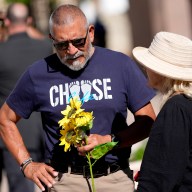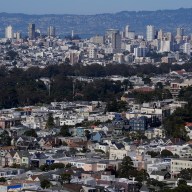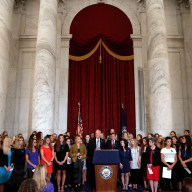SATURNA, B.C. – A toddler was left asking for her mother and a survivor was left inconsolable after a float plane crash off one of British Columbia’s Gulf Islands.
Six people, including a Vancouver doctor and her six-month-old baby, were identified Monday as the victims of the crash of the Seair Seaplanes flight shortly after taking off from Saturna Island the day before. The pilot and a female passenger were rescued from the frigid waters by locals.
RCMP said Kerry Margaret Morrissey, 41, and her baby Sarah were killed.
“She was a cool person,” her sister-in-law Sharon Morrissey, who lives in Washington state, told Pacific Northwest Local News. “She helped women obtain medical care. She travelled to South America and worked with Catholic missions there. She was a real good person. It’s a real loss to everybody.”
Morrissey, who at work went by her maiden name Telford, had been working at the Vancouver-based South Community Birth Program. She gave birth to her second daughter, Sarah Grace Morrissey, in May.
Morrissey, who was not reachable Monday, said her sister-in-law also had a two-year-old-daughter.
“She’s already asking her dad why mommy’s not coming back,” Morrissey said.
Also killed in the crash were Catherine White-Holman, 55, of Vancouver, Thomas Gordon Glenn, 60, of White Rock, B.C., and Cindy Shafer, 44, and Richard Bruce Haskett, 49, part-time Saturna Island residents who lived in Huntington Beach, Calif.
Residents rushed to the scene in their boats after the plane went down around 4:30 p.m. Sunday. The first to arrive was James White.
Interviewed Monday on his dock, White said he heard a noise and headed out to the site in his boat. As he approached, he saw two objects in the water and thought at first they were crab traps. As he got closer, he said he realized they were people.
“I could see two heads,” he said. “I saw the woman first. She was screaming, ‘Help me, help me.’ “
White said he drifted his boat towards the pilot, who was “pretty distressed.”
Unable to pull them up into his boat alone, White said earlier he had to tie them to the side of the boat, floating in the frigid water for a few minutes, until others arrived to help haul them in. There was no sign of the plane or the six others on board.
Asked how many people were on board, White said the pilot was inconsolable.
“I’ve killed them all,” he said the pilot cried out.
There’s little indication so far what brought down the plane, which has not yet been raised from its watery grave 11 metres below the ocean’s surface.
Bill Yearwood of the Transportation Safety Board said investigators are hoping the pilot can tell them what went wrong. Yearwood said the pilot had undergone surgery for his injuries and was recovering in hospital.
“The RCMP has and they will make those witness statements available to us. We’re hoping to speak to the pilot as soon as he is fit enough,” he said Monday.
“He’s had surgery and is recovering in hospital. We expect him to recover and that’ll help us a lot with what direction to head in.”
Helicopters were still circling the harbour Monday above where the float plane was last seen before it sank, and the RCMP vessel Higgitt was on the water.
Saturna resident Ilka Olsen said Shafer and Haskett were well-known community residents who had an ownership stake in the Lighthouse Pub. They had just boarded the de Havilland Beaver aircraft before the crash.
Morrissey and White-Holman were longtime employees of Vancouver Coastal Health, said spokeswoman Anna Marie D’Angelo.
White-Holman, a social worker, had been employed by the authority more than 15 years, most recently at Three Bridges Community Health Centre.
“We’re very shocked and saddened by the deaths of these two very respected health care professionals,” D’Angelo said, adding colleagues were reeling Monday at both community health centres.
While D’Angelo didn’t know why they were visiting the island, she said it wasn’t work related.
A profile on the website where Morrissey worked said she trained students in midwifery, medicine and nursing, while also teaching as a clinical instructor at the University of British Columbia. It also says she volunteered for nine months at a hospital in a Peruvian jungle several years ago.
The deaths stopped cold the tight-knit, friendly Saturna Island. Residents said Monday they were numbed by the tragedy, and too distraught to even speak. Others said it was as if all 350 residents had gone into hiding.
“Everyone knows what has happened and everyone knows how everyone is feeling,” said B.C. Ferries employee Michael Vautour, who witnessed the crash from his post at the Lyall Harbour ferry terminal.
Vautour said he called 911 and the coast guard after seeing the float plane nose-dive into the harbour, with its tail end sticking out of the water for several minutes, before sinking beneath the surface.
“It’s a small community where you can have no enemies,” he said. “Everyone has their little place in the community. There’s lots of support going on, but it’s very quiet.”
Vautour said he didn’t spend a lot of time with the two part-time Saturna residents who died in the crash, but the couple was well-liked and the loss had the community wrapped tightly with grief.
“They were great people, very happy-go-lucky, very outgoing,” Vautour said.
Not all residents retreated to their homes to grieve alone. One woman made sandwiches and coffee for hours for rescue volunteers, saying it was her way of keeping the community strong.
Many residents gathered at the Saturna Community Hall to meet with disaster counsellors trained to help people come to grips with traumatic incidents – some of them still wearing their volunteer rescue uniforms.
As the sun went down Monday a lone bouquet of flowers decorated the gangway of the float plane dock in the harbour.
– with a file from Tamsyn Burgmann in Vancouver














